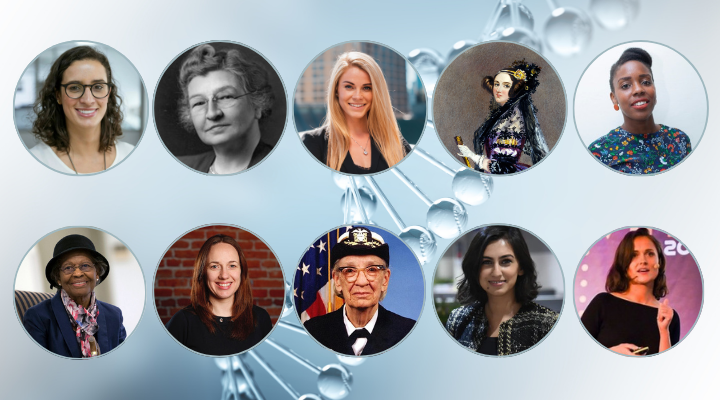Celebrating Trailblazers: International Day of Women and Girls in Science
On the International Day of Women and Girls in Science, we honor the remarkable contributions of women who have broken barriers and redefined the boundaries of science, technology, engineering, and mathematics (STEM). From pioneering innovations to addressing global challenges, these trailblazers inspire future generations to pursue careers in STEM and make lasting impacts on society.
Here are ten remarkable women whose work continues to drive progress and redefine the future of science, technology, engineering, and mathematics.
Cristina Albuquerque
Cristina Albuquerque is the Director of Global Electric Mobility at the WRI Ross Center for Sustainable Cities and WRI Brasil. She leads efforts to electrify public transportation systems worldwide, transforming urban transport into cleaner, more sustainable models.
Previously, as Senior Urban Mobility Manager at WRI Brasil, Cristina focused on enhancing public service quality while reducing environmental impacts. She supports cities in designing and implementing low-carbon, high-efficiency transport solutions and policies. Her expertise includes transport electrification, demand management, and innovative sustainable mobility strategies. Cristina also represents WRI at the BRT Center of Excellence.
Cristina holds a Bachelor's degree in Industrial Engineering and a Master's in Transportation Systems from the Federal University of Rio Grande do Sul, with a specialization in Project Management. Her work continues to redefine urban mobility, creating systems that are both efficient and environmentally sustainable.
Edith Clarke
Edith Clarke (1883–1959) was a pioneering electrical engineer and the first woman to earn a master’s degree in electrical engineering from MIT. She invented the Clarke Calculator in 1925, revolutionizing power transmission analysis by solving complex equations faster than conventional methods.
As the first professionally employed female electrical engineer in the U.S. and a full voting member of the American Institute of Electrical Engineers, Clarke broke barriers throughout her career. She authored 19 technical papers and the influential textbook Circuit Analysis of A.C. Systems.
In 1947, she became the first woman to teach engineering at the University of Texas, inspiring future engineers with her groundbreaking work. Clarke’s legacy remains a cornerstone of electrical engineering, reflecting her relentless pursuit of excellence in STEM.
Egija Gailuma
Egija Gailuma is a Baltic entrepreneur recognized on Forbes’ 30 Under 30 for Leadership & Management. She co-founded OX Drive, a Tesla car-sharing service that became one of the region's fastest-growing brands before its 2024 acquisition by CarGuru.
Overcoming early challenges, Egija scaled OX Drive from 40 Teslas to market success. Post-merger, she transformed her in-house Tesla repair shop into a thriving business and now leads ventures like BESS Manufacturing, which develops battery energy storage systems.
Egija’s work spans the automotive and energy sectors, blending sustainability and innovation. As a trailblazer in male-dominated industries, she inspires the next generation of entrepreneurs with her commitment to redefining the future of mobility and energy.
Ada Lovelace
Ada Lovelace (1815–1852) is celebrated as the "prophet of the computer age." She foresaw the potential of computers beyond mathematics, laying the foundation for modern computation.
Educated in mathematics, Ada collaborated with Charles Babbage on the Analytical Engine. In 1843, she published extensive notes describing a sequence of operations for solving mathematical problems, earning her the title of "the first programmer."
Lovelace envisioned computers processing not only numbers but also symbols and complex tasks like composing music. Her groundbreaking ideas marked the shift from calculation to computation, influencing the evolution of technology.
Charlène Kouassi
Charlène Kouassi began her career at a startup incubator in Abidjan in 2018 after earning her degree in Emerging Countries’ Development Dynamics from the Geography Institute of Paris. She joined the African Mobilities Observatory, which became Movin’On LAB Africa in 2021, where she now leads efforts in sustainable mobility.
In 2023, she was named a Remarkable Feminist Voice of Transport by TUMI/GIZ’s "Women Mobilize Women" initiative. Charlène collaborates with stakeholders across Africa and Europe to develop inclusive, human-centered transport systems, emphasizing local innovation and resource utilization.
Her vision is to harmonize urban planning and mobility, sharing best practices to tackle climate change and make African cities drivers of sustainable development.

Top (from left to right); Cristina Albuquerque, Edith Clarke, Egija Gailuma, Ada Lovelace, Charlène Kouassi. Bottom (from left to right) Gladys West, Fiona Howarth: CEO, Grace Hopper, Maha Shahzad, Aurelija Petrauskyte Latake,
Gladys West
Gladys West is an American mathematician known for her work contributing to the development of the Global Positioning System (GPS). One of her early projects was the Naval Ordnance Research Calculator (NORC), a program that used 100 hours of calculations to track Pluto's movement relative to Neptune. She later became project manager for SEASAT, an experimental satellite that successfully demonstrated satellites could collect ocean data. This led to GEOSAT, which created computer models of Earth’s surface, aiding in the development of accurate GPS technology.
Aurelija Petrauskyte Latake
From Vilnius, Lithuania, Aurelija Petrauskyte Latake, an experienced product leader with a proven track record of delivering digital products to millions. Leading product innovation at Trafi, she focuses on smarter transport solutions. Aurelija has worked with major tech companies like Google and Lyft, specializing in scalable solutions and building autonomous teams. Passionate about cognitive psychology, she uses data science to create smarter, faster, and more personalized products that meet real customer needs.
Fiona Howarth
Fiona Howarth, currently the CEO-on-Sabbatical at Octopus Electric Vehicles in the UK, has spent the past two years assembling a diverse team of experts from across the auto industry and beyond. From former Big Gas Guzzler leaders to environmental science specialists and seasoned energy professionals, this passionate team is dedicated to driving the global electric vehicle revolution. Fiona is a sharp strategic and analytical thinker with a keen eye for detail, ensuring successful progress in complex product development and cross-functional initiatives.
Grace Hopper
Grace Hopper was an American mathematician and rear admiral in the U.S. Navy, known for pioneering computer technology. She helped develop the UNIVAC I, the first commercial electronic computer, and contributed to COBOL, a language for naval applications. Hopper worked on the Mark I, the first large-scale automatic calculator, at Harvard University in 1944, and authored the first computer manual in 1946. She was recognized as a fellow of the Institute of Electrical and Electronics Engineers (1962) and named Computer Science Man of the Year by the Data Processing Management Association (1969).
Maha Shahzad
Maha Shahzad is the founder of BusCaro, a company she established to provide commuters in Karachi, Pakistan, with a safe and reliable alternative for their daily journeys. Her inspiration for the venture stemmed from personal experience; at 19, she had to drop out of junior college in Southern California due to a gruelling six-hour daily commute. Later, when working in Pakistan, she spent half of her salary on commuting, unable to find safe public transportation, an issue affecting many Pakistanis. Shahzad highlighted to TechCrunch that 85% of working women in the country have faced sexual harassment on public transport, further emphasizing the need for solutions like BusCaro.
Conclusion
In conclusion, these remarkable women in STEM have not only broken barriers but have also reshaped the future of their fields, inspiring progress and innovation across generations. Their work exemplifies how passion, determination, and ingenuity can drive lasting change, making the world a better, more equitable place.





